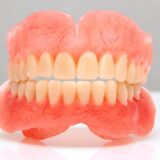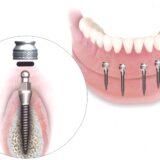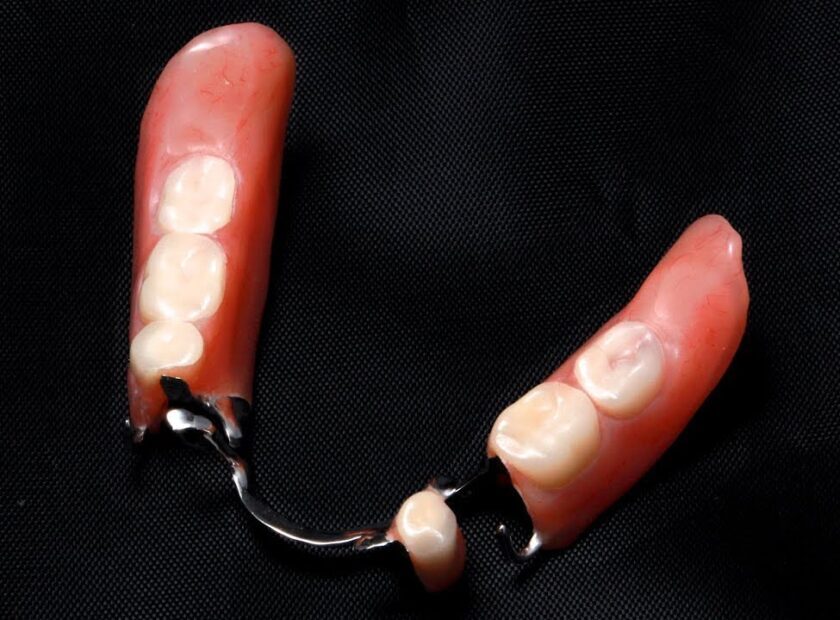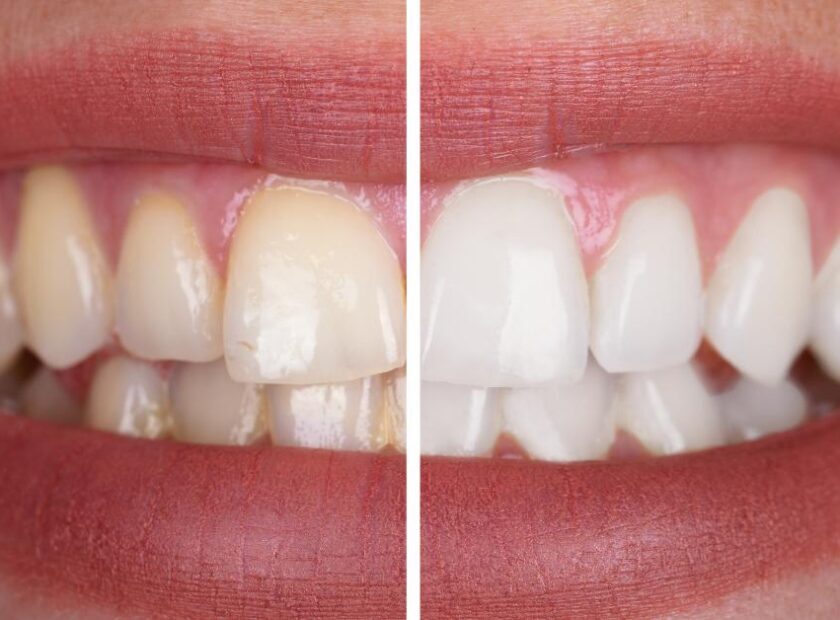Lower denture implants

Lower Denture Implants require a minimum of two implants for securing a prosthesis to the lower jaw and a minimum of four implants for the upper jaw. Lower denture stabilizers are the perfect solution to fix the issues associated with dentures, including movement and discomfort.
The stabilizers aid in securing the lower dentures by providing stable support. Dental implants for dentures also prevent progressive bone loss and enhance your ability to chew, speak and smile as compared to traditional dentures. Implant-supported dentures come in multiple types like ball attachment denture, bar attachment denture, screw-retained denture, and individual implants.
Dental implants cost varying from patient to patient based on their needs and requirements. Learn about lower denture implants, different types of implant-supported dentures, how they work, their benefits, and care.
Understanding Lower Denture Implants
Lower denture implants are a solution for people who want to replace their missing lower teeth. With at least two implants necessary to secure a prosthesis to the lower jaw, this method offers more stability to traditional dentures. Implant-supported dentures come with a more permanent solution and long-lasting results
Lower denture implants are an innovative solution to the problems that people with lower denture wearers often face. These implants work by anchoring the denture to the jawbone. With the help of two or more implants, the dentures are firmly secured in place. Types of implant dentures include ball attachment denture, bar attachment denture, screw-retained denture, and individual implants. The cost of lower denture implants varies based on factors such as the number of implants required and geographic location. To stabilize your lower teeth with an implant overdenture, you need to get at least two, and for upper jaws, four implants are required. Implant-supported dentures are an oral appliance that replaces several teeth at once. It’s similar to traditional dentures but is instead anchored by implants for a more permanent solution. For more information, consult your dental health professional.
Benefits Of Lower Denture Implants
Lower denture implants can provide stability and enhance the functionality of dentures. With just two implants, a lower implant-retained denture can be fixed in place, enabling patients to eat and speak with confidence. The procedure can also prevent jawbone deterioration, which can occur with traditional dentures.
Lower denture implants provide many benefits, including improved stability, enhanced speech, better comfort, and prevention of bone loss. With implant-supported dentures, patients can enjoy increased confidence in daily activities, such as eating and speaking, without worrying about dentures slipping or falling out. By securing the dentures in place, implants prevent bone loss, which can lead to changes in facial structure and difficulty wearing traditional dentures. Additionally, implants are more comfortable than traditional dentures, which can rub against the gums and cause pain. Implant-supported dentures also improve speech by allowing patients to enunciate more clearly. In short, lower denture implants are an excellent solution for those looking for a more comfortable, stable, and long-lasting alternative to traditional dentures.
Who Is A Good Candidate For Lower Denture Implants?
Online search results show that dental implants have become a popular solution for stabilizing loose or ill-fitting dentures. For those considering lower denture implants, good oral health is essential for successful implantation. Additionally, healthy bone mass is necessary to ensure the implant can fuse to the jawbone. Non-smokers are also ideal candidates, as smoking can negatively impact the healing process of the implant. For those choosing lower denture implants, a minimum of two implants is typically necessary. Different types of implant-supported dentures are available, including bar attachment, screw-retained, and individual implants. The cost of lower implant-retained dentures varies depending on the type of denture chosen and the number of implants needed.
The Procedure For Lower Denture Implants
When it comes to lower denture implants, the initial consultation is the first step of the procedure. During this consultation, the dentist will examine the patient’s mouth and determine if they are a good candidate for implants. If they are, the next step is implant placement, where the implants will be surgically placed into the jawbone. The healing period of the procedure typically lasts several months, during which time the bone will fuse with the implants and create a strong foundation for the denture. Once the healing period is complete, the denture can be placed onto the implants. One option for a lower denture is an implant overdenture, which snaps onto two implants placed in the lower jaw. There are also other options for implant-supported dentures, including bar attachment dentures, screw-retained dentures, and individual implants. The cost of a lower implant retained denture varies depending on the number of implants needed and other factors, but it is a permanent and more stable solution than traditional dentures.
Aftercare And Maintenance For Lower Denture Implants
Proper aftercare and maintenance are essential for lower denture implants to last longer and prevent any complications. Brushing the dentures regularly, avoiding hard and sticky food, removing them before bedtime, and scheduling regular dental visits are some of the measures that can help maintain healthy implants.
Maintaining proper oral hygiene practices is crucial for the longevity of lower denture implants. Regular brushing with a soft-bristled brush and mild toothpaste can prevent bacteria buildup and minimize the risk of infection. Dentures should be removed and washed with a cleansing solution daily to prevent staining and odor. It is recommended to visit a dentist for regular check-ups to ensure the implants are stable and the denture fits properly. Additionally, avoid using abrasive cleaning tools or harsh chemicals as it can damage the implant. Maintaining proper care and hygiene practices combined with routine dental checkups ensures the longevity and success of lower denture implants.

Credit: www.durhamimplantsolutions.com
Risks And Complications Of Lower Denture Implants
Lower denture implants come with certain risks and complications such as infection, implant failure or gum recession. To ensure proper healing and long-term success, it’s important to follow the aftercare guidelines provided by your dentist and attend regular check-ups.
| Risks and Complications of Lower Denture Implants |
| Infection |
| Lower denture implants can cause infections if proper oral hygiene is not maintained after the surgery. Bacteria can accumulate around the implant area leading to swelling, redness, and pain. An infected implant can lead to implant failure, which may require removal of the implant. |
| Implant Failure |
| Lower denture implants have a risk of failure due to various reasons such as implant rejection, overloading, improper integration, or inadequate bone density. Implant failure can lead to further complications, including infection, pain, and discomfort. |
| Nerve Damage |
| Lower denture implants require significant surgical procedures, and there is a risk of nerve damage during the surgery. Nerve damage can cause numbness, tingling sensation in the mouth, lips, or tongue, and can lead to further complications, such as difficulty in eating and speaking. |
| Sinus Problems |
| If the implants are placed too close to the sinus cavity, it can lead to sinus problems, such as sinusitis or sinus infections. Symptoms may include pain, headache, congestion, or difficulty in breathing. It is crucial to seek medical attention if any such problems arise. |
Comparison Of Lower Denture Implants To Traditional Dentures
| Comparison of Lower Denture Implants to Traditional Dentures |
|---|
| Lower denture implants provide a range of benefits that traditional dentures do not.
|
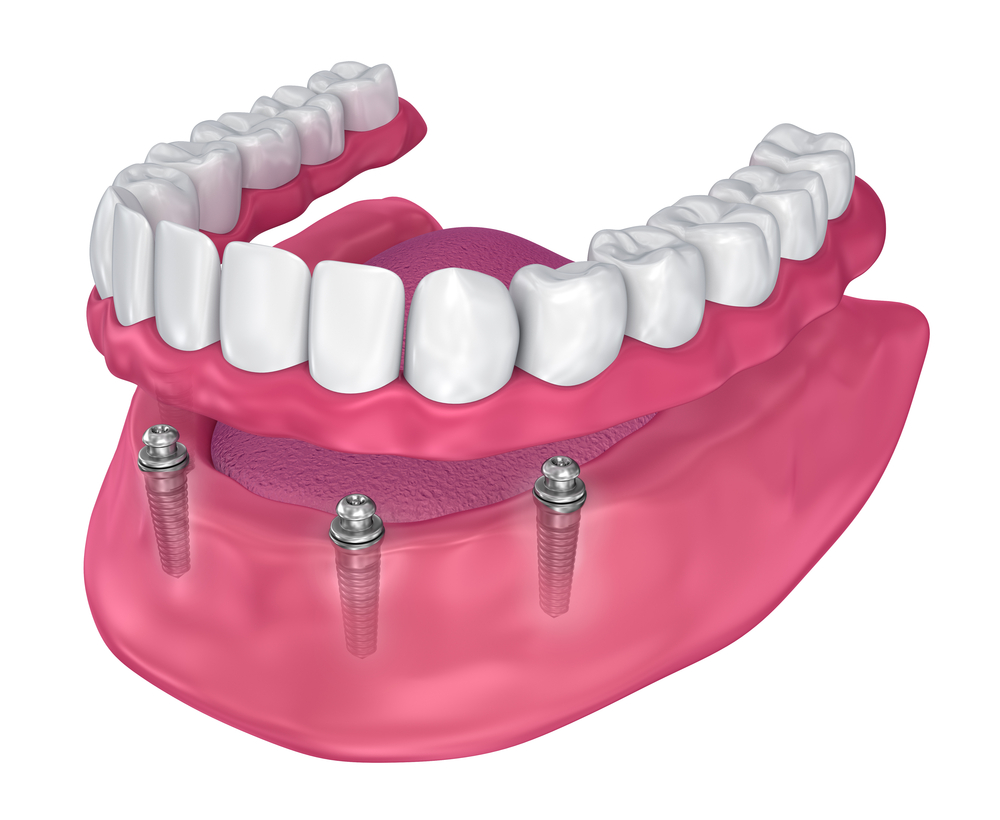
Credit: www.baysidedentalspa.com
Testimonials From Patients With Lower Denture Implants
| Improved Quality of Life: Patients with lower denture implants have reported a significant improvement in their quality of life as they can eat, speak, and smile more confidently without worrying about their dentures slipping or shifting. |
| Increased Confidence: Lower denture implants can help patients regain their lost confidence and self-esteem as they don’t have to worry about their dentures falling out while talking or eating in public. |
| Better Overall Oral Health: Lower denture implants can also improve overall oral health by preventing bone loss and preserving the jawbone’s integrity. |
Patients who have opted for lower denture implants have reported a better quality of life, increased confidence, and improved oral health. With lower denture implants, patients can enjoy their favorite foods without any discomfort or embarrassment, speak with confidence, and smile without worrying about their dentures slipping or shifting. Moreover, lower denture implants have also been proven to prevent bone loss and preserve the jawbone’s integrity, resulting in better overall oral health. So, if you want to improve your quality of life, boost your confidence, and achieve better oral health, lower denture implants could be an excellent option for you.
Conclusion
Lower denture implants provide a more permanent solution for patients with loose or missing teeth. With the help of dental implants, patients can enjoy improved stability, comfort, and confidence in their ability to eat and speak. There are various options available for lower denture implants, and the number of implants required depends on the individual case.
If you are considering lower denture implants, consult with a qualified dentist to discuss your options and determine the best course of action for your dental health.

